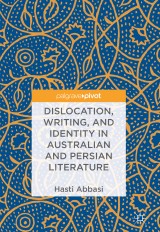Details

Dislocation, Writing, and Identity in Australian and Persian Literature
|
CHF 65.00 |
|
| Verlag: | Palgrave Pivot |
| Format: | |
| Veröffentl.: | 25.08.2018 |
| ISBN/EAN: | 9783319964843 |
| Sprache: | englisch |
Dieses eBook enthält ein Wasserzeichen.
Beschreibungen
<p></p><p>This study aims to foreground key literary works in Persian and Australian culture that deal with the representation of exile and dislocation. Through cultural and literary analysis, <i>Dislocation, Writing, and Identity in Australian and Persian Literature</i> investigates the influence of dislocation on self-perception and the remaking of connections both through the act of writing and the attempt to transcend social conventions. Examining writing and identity in David Malouf’s <i>An Imaginary Life</i> (1978), Iranian Diaspora Literature, and Shahrnush Parsipur’s <i>Women Without Men</i> (1989/ Eng.1998), Hasti Abbasi provides a literary analysis of dislocation, with its social and psychological manifestations. Abbasi reveals how the exploration of exile/dislocation, as a narrative that needs to be investigated through imagination and meditation, provides a mechanism for creative writing practice.</p><br><p></p>
<p>1. Introduction: Dislocation and Writing.- 2. Writing in Exile.- 3. Malouf’s <i>An Imaginary Life</i>.- 4.<i> </i>Parsipur’s <i>Women Without Men </i>and Iranian Diaspora Women’s Literature.- 5. Conclusion.</p>
<p></p><p><b>Hasti Abbasi</b> teaches Bachelor of Arts courses at Griffith University, Australia. Abbasi has been short listed for the 2018 Viva la Novella VI Prize for her novella <i>And the Raindrops Fill the Sea</i>.</p><br><p></p>
This study aims to foreground key literary works in Persian and Australian culture that deal with the representation of exile and dislocation. Through cultural and literary analysis, <i>Dislocation, Writing, and Identity in Australian and Persian Literature</i> investigates the influence of dislocation on self-perception and the remaking of connections both through the act of writing and the attempt to transcend social conventions. Examining writing and identity in David Malouf’s <i>An Imaginary Life</i> (1978), Iranian Diaspora Literature, and Shahrnush Parsipur’s Women Without Men (1989/ Eng.1998), Hasti Abbasi provides a literary analysis of dislocation, with its social and psychological manifestations. Abbasi reveals how the exploration of exile/dislocation, as a narrative that needs to be investigated through imagination and meditation, provides a mechanism for creative writing practice.
Provides a case study for understanding exile literature broadly Examines theories of nomadism, dislocated women, and other socio-cultural and historical aspects of feminist and women’s writing Investigates the impact of dislocation on literary production and creative writing
<p>“Hasti Abbasi’s comparative study of Sharnush Parsipur and David Malouf shows how these writers cross borders of nation, affiliation, gender, and genre while remaining true to their own sense of lived experience and personal autonomy. Abbasi shows how literature can tap into the meaningfulness of social relation while avoiding the social control of too firm a sense of belonging.” (Nicholas Birns, Adjunct Professor at New York University, USA, and author of Contemporary Australian Literature: A World Not Yet Dead (2015))</p><br>
Diese Produkte könnten Sie auch interessieren:

The Enigma of Good and Evil: The Moral Sentiment in Literature

von: Anna-Teresa Tymieniecka

CHF 354.00















